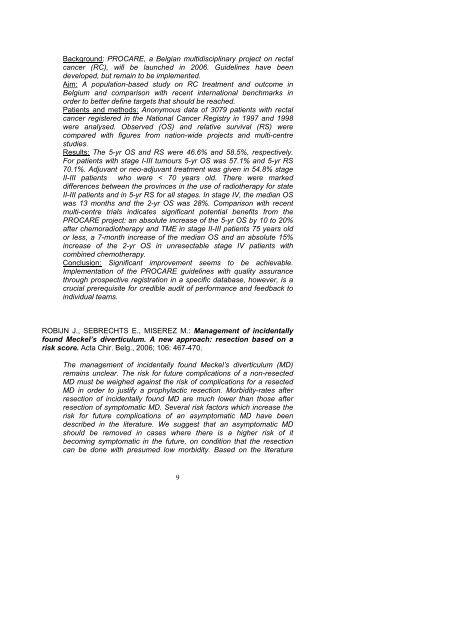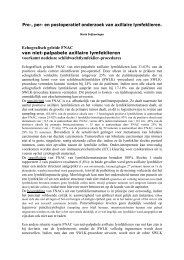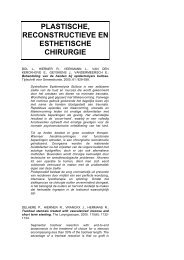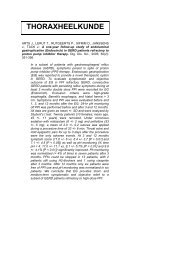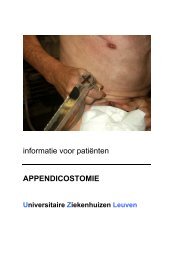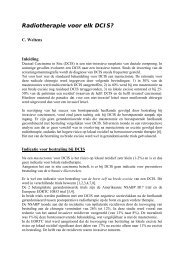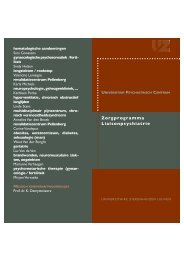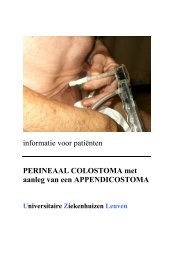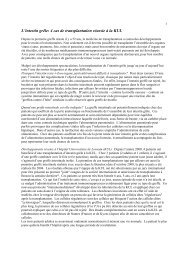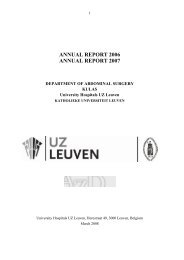2006 - UZ Leuven
2006 - UZ Leuven
2006 - UZ Leuven
Create successful ePaper yourself
Turn your PDF publications into a flip-book with our unique Google optimized e-Paper software.
Background: PROCARE, a Belgian multidisciplinary project on rectalcancer (RC), will be launched in <strong>2006</strong>. Guidelines have beendeveloped, but remain to be implemented.Aim: A population-based study on RC treatment and outcome inBelgium and comparison with recent international benchmarks inorder to better define targets that should be reached.Patients and methods: Anonymous data of 3079 patients with rectalcancer registered in the National Cancer Registry in 1997 and 1998were analysed. Observed (OS) and relative survival (RS) werecompared with figures from nation-wide projects and multi-centrestudies.Results: The 5-yr OS and RS were 46.6% and 58.5%, respectively.For patients with stage I-III tumours 5-yr OS was 57.1% and 5-yr RS70.1%. Adjuvant or neo-adjuvant treatment was given in 54.8% stageII-III patients who were < 70 years old. There were markeddifferences between the provinces in the use of radiotherapy for stateII-III patients and in 5-yr RS for all stages. In stage IV, the median OSwas 13 months and the 2-yr OS was 28%. Comparison with recentmulti-centre trials indicates significant potential benefits from thePROCARE project: an absolute increase of the 5-yr OS by 10 to 20%after chemoradiotherapy and TME in stage II-III patients 75 years oldor less, a 7-month increase of the median OS and an absolute 15%increase of the 2-yr OS in unresectable stage IV patients withcombined chemotherapy.Conclusion: Significant improvement seems to be achievable.Implementation of the PROCARE guidelines with quality assurancethrough prospective registration in a specific database, however, is acrucial prerequisite for credible audit of performance and feedback toindividual teams.ROBIJN J., SEBRECHTS E., MISEREZ M.: Management of incidentallyfound Meckel’s diverticulum. A new approach: resection based on arisk score. Acta Chir. Belg., <strong>2006</strong>; 106: 467-470.The management of incidentally found Meckel’s diverticulum (MD)remains unclear. The risk for future complications of a non-resectedMD must be weighed against the risk of complications for a resectedMD in order to justify a prophylactic resection. Morbidity-rates afterresection of incidentally found MD are much lower than those afterresection of symptomatic MD. Several risk factors which increase therisk for future complications of an asymptomatic MD have beendescribed in the literature. We suggest that an asymptomatic MDshould be removed in cases where there is a higher risk of itbecoming symptomatic in the future, on condition that the resectioncan be done with presumed low morbidity. Based on the literature9


